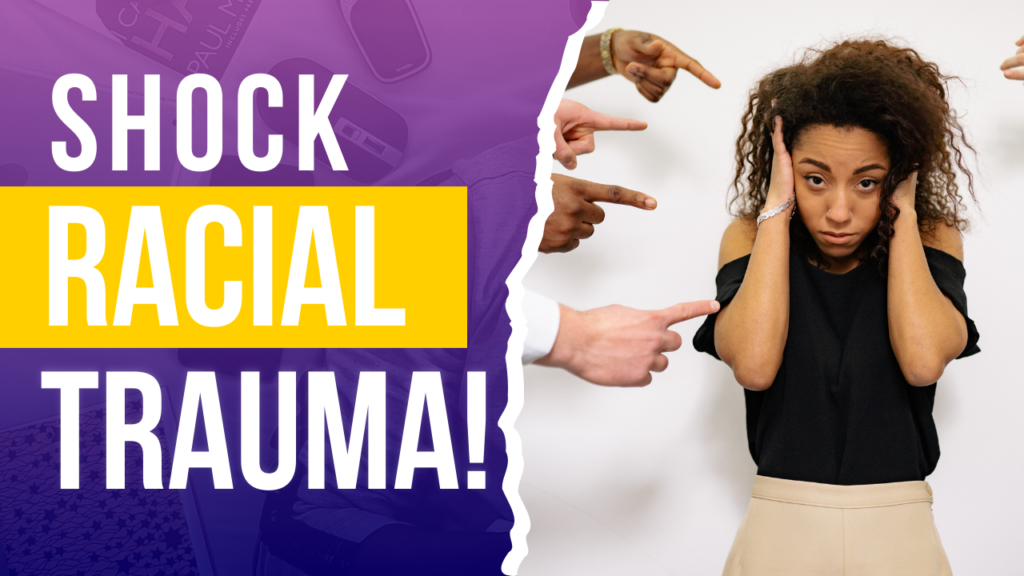
Researched and Curated By Rev. Dr. Philippe SHOCK Matthews
(Black Trauma and Mental Health Specialist | Prompt Eng | GPT Dev | Research Scientist | Africana Phenomenologist | Black AI Corsortim co-Founder)
A Critical Examination of New Thought Metaphysics
The Law of Attraction (LoA), particularly in its Eurocentric manifestation, has been a subject of my extensive research and personal interactions with numerous scholars and experts featured in the popular film “The Secret.” As a research scientist specializing in Africana phenomenology and racial trauma, I have come to a sobering realization: this widely promoted concept may inadvertently exacerbate trauma in Black individuals, leading to a cascade of negative psychological effects.
My investigations have revealed a troubling pattern. The LoA, as commonly presented, can imprint further trauma onto the already burdened nervous systems of Black people. This process often results in heightened feelings of disappointment, abandonment, and failure, ultimately fostering a pervasive sense of hopelessness. The implications of this finding are profound and warrant a critical examination of the LoA’s principles and applications.
The Eurocentric bias inherent in many LoA teachings fails to account for the unique historical, social, and psychological contexts of Black experiences. This oversight can lead to a dangerous oversimplification of complex systemic issues, placing an undue burden on individuals to overcome societal barriers through sheer force of will and positive thinking. Such an approach not only ignores the reality of structural racism but can also internalize feelings of inadequacy when desired outcomes remain elusive despite one’s best mental efforts.
Moreover, the emphasis on personal responsibility in manifesting one’s reality, while potentially empowering in some contexts, can be particularly harmful when applied without nuance to marginalized communities. It risks reinforcing harmful narratives that attribute systemic inequalities to individual shortcomings rather than acknowledging the pervasive influence of historical and ongoing discrimination.
In light of these concerns, I believe it is crucial to subject the Law of Attraction to rigorous, culturally informed scrutiny. This critical examination should explore how the LoA intersects with issues of race, privilege, and systemic oppression. It must also consider the potential for alternative, more inclusive frameworks that acknowledge the complex realities faced by Black individuals and other marginalized groups.
Throughout this series, I will delve deeper into these issues, drawing on my research, interviews, and personal observations. My goal is to provide a nuanced understanding of the LoA’s impact on Black psychology and to propose more culturally sensitive approaches to personal development and empowerment. By critically examining the LoA through the lens of Africana studies and racial trauma research, we can work towards more inclusive and truly empowering paradigms of self-improvement and collective healing.
Part 1: A Critical Examination of its Scientific Validity
The Law of Attraction (LoA), a cornerstone principle of New Thought philosophy, has garnered significant attention in popular culture through self-help literature and motivational speaking. However, its scientific legitimacy has been subject to extensive scrutiny by researchers and psychologists. This comprehensive analysis delves into the pseudoscientific foundations of the LoA and its misappropriation of scientific concepts.
Fundamental Principles and Popular Appeal
The LoA postulates that an individual’s thoughts and emotions can directly influence their physical reality. This concept has found resonance with many seeking personal empowerment and life improvement. The allure of the LoA lies in its promise of control over one’s destiny through the power of positive thinking and visualization.
Misappropriation of Scientific Terminology
One of the most problematic aspects of the LoA is its tendency to co-opt scientific language, particularly from the field of quantum mechanics, to lend credibility to its claims. This misuse of scientific terminology is not only misleading but also contributes to the spread of scientific misinformation.
Quantum Mechanics and Macroscopic Reality
Proponents of the LoA often invoke quantum phenomena to explain how thoughts can influence macroscopic events. However, this is a fundamental misapplication of quantum theory. As noted by physicists such as Victor Stenger and Leon Lederman, quantum effects are primarily relevant at the subatomic level and do not directly translate to everyday experiences in the way LoA advocates suggest.
Lack of Falsifiability and Empirical Support
A critical issue with the LoA is its inherent lack of falsifiability, a crucial criterion for scientific theories as outlined by philosopher Karl Popper. The LoA’s proponents often attribute failures to manifest desired outcomes to insufficient belief or the presence of negative thoughts. This circular reasoning creates a self-fulfilling prophecy that effectively shields the theory from rigorous scientific testing.
The Problem with Anecdotal Evidence
The LoA heavily relies on anecdotal evidence and personal testimonials rather than empirical data. While individual success stories can be compelling, they do not constitute scientific proof. These narratives often overlook crucial factors such as hard work, perseverance, and external circumstances that contribute to achieving desired outcomes.
Oversimplification of Complex Life Situations
The LoA’s emphasis on the power of thought tends to oversimplify complex life situations and ignores the role of external factors and systemic issues. While positive thinking can indeed have beneficial effects on mental health and motivation, scientific evidence does not support the claim that thoughts alone can shape reality.
Ethical Concerns and Potential Harm
The promotion of the LoA as a scientifically valid concept raises significant ethical concerns. By presenting itself as a legitimate scientific theory, the LoA may mislead individuals into believing that complex life problems can be solved through thought alone. This belief could potentially discourage people from seeking evidence-based solutions or professional help when needed, particularly in cases of mental health issues or serious life challenges.
Scientific Consensus and Critique
The scientific community largely regards the Law of Attraction as pseudoscience. Numerous researchers have criticized its lack of empirical evidence, misuse of scientific concepts, and oversimplification of complex psychological and sociological phenomena. Critics argue that while positive thinking and visualization can have beneficial effects, they should not be conflated with the ability to directly manipulate physical reality through thought alone.
Conclusion
While the Law of Attraction continues to captivate many with its promise of personal empowerment, its scientific validity remains highly questionable. The misuse of scientific concepts, lack of empirical evidence, and oversimplification of complex life situations significantly undermine its credibility as a valid theory of personal development and success.
It is crucial for individuals to approach self-help concepts with critical thinking and seek evidence-based strategies for personal growth and problem-solving. While positive thinking and visualization can be valuable tools for mental well-being and goal setting, they should be viewed as complementary to, rather than substitutes for, practical action, professional guidance, and evidence-based approaches to life’s challenges.
Brought To You By…
- [IMMEDIATE DOWNLOAD] Know Your Rights eBook by the Law Office of Keith J. Staten https://bit.ly/4bD3MbK
- Enhancing Cognitive Performance: The Power of Neuromelanin Boosters https://t.ly/S-ePs
- FREE web series: Nothing is Wrong with Black People…Something Happened to Black People: https://bit.ly/3FJCsLo
- BlackTraumaGPT http://blacktraumagpt.com/
- MyGuardianDoc™ https://bit.ly/3TlgPaE – Your One-Stop for On-Demand Compassionate Medical Guidance, Urgent Care, Primary Care, and Virtual Second Opinions, all provided by licensed Medical Doctors.
Enjoying Our Content?
Become a member of our Patreon to get the latest research on Racial Black Trauma and learn the hidden science behind why 1st Frequency Black people are God’s/Amma’s greatest creation! https://www.patreon.com/revshock. Or buy Rev. SHOCK a Coffee! https://bit.ly/3yg5D7A


Book A Discovery Call
Are you ready to SHOCKtrauma? Click HERE now to book a discovery call with Rev. Dr. Philippe SHOCK Matthews

Get Social with Doc SHOCK:
PATREON: https://t.ly/mjksf | REV. DR. SHOCK (PERPLEXITY PAGE): https://t.ly/ppjwh | SOLO: https://solo.to/revshock | BIO: https://t.ly/Ko_y_ | BLOG: https://t.ly/j6bh0 | PODCAST: https://t.ly/cB5GD | ENDORSEMENT: https://t.ly/jFErO | THREADS: https://t.ly/SoKkT | IG: https://t.ly/XsN8f | FB: https://t.ly/R3r9Y | X: https://t.ly/iJ-wy | LINKEDIN: https://t.ly/GZ0pe | TIKTOK: https://t.ly/zfp60 | BLACK TRAUMA GPT: https://t.ly/vswbs | BLACK AI CONSORTIUM: https://t.ly/uiRZN | BOOKS BY PM: https://t.ly/vvHMd


The common misunderstanding is that LOA guarantees specific outcomes based Soley on thought is just that, a misunderstanding. The impact on personal reality by sole thoughts raises several questions. Are there different types of thoughts? Do thoughts alone have power to make things happen? What evidence leads to proof that thoughts alone does make things happen? I am not convinced that certain sciences are qualified to make determinations about nonphysical realms. If several people were thinking the same thoughts to make a thing happen at a specific time and waited for this thing to happen and it came to pass, would this prove that thoughts alone make things happen? If it did not happen would this be proof that thoughts alone do not make things happen? I am intentionally leaving out an element not mentioned in your argument against the inference of LOA.
Absolute fact Bro. Ralph! As someone who has a doctorate in Metaphysics, I have to investigate all claims made by my institution, which is why I wrote the book: The Shock Theology Special Report: The Dark Side of New Thought Metaphysics & Religious Science https://amzn.to/4glM4fi. Your observation is spot on!